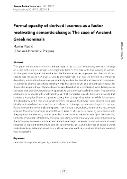Formal opacity of derived lexemes as a factor motivating semantic change: the case of Ancient Greek nominals

Datum vydání
2021Publikováno v
Graeco-Latina BrunensiaRočník / Číslo vydání
26 (1)ISBN / ISSN
ISSN: 1803-7402Informace o financování
UK/GAUK/GAUK424420
UK/UNCE/HUM/UNCE/HUM/016
Metadata
Zobrazit celý záznamKolekce
Tato publikace má vydavatelskou verzi s DOI 10.5817/GLB2021-1-8
Abstrakt
This paper introduces synchronic formal opacity as a factor motivating semantic change on a par with cultural changes and pragmatic factors. The role of formal opacity in semantic change is investigated within the broader framework of lexicogenesis, i.e. the sum of processes that introduce new pairs of words and meanings in a linguistic system. In contrast to derivation, which introduces new pairs initially marked by formal and semantic transparency, semantic change can affect existing words that are formally and semantically opaque for those who acquire them. Opaque lexemes are described as unmotivated signs lacking a cue structure that would otherwise point speakers to the concepts labelled by them. This semiotic arbitrariness contrasts with motivated signs, that is morphologically transparent words that contain a recognized base morpheme cueing the concept they refer to. While focusing on this dichotomy in the lexicon of Ancient Greek, we argue that every novel derived word was initially motivated and contained a direct reference to the appropriate extra-linguistic concept. If a word ceased to be formally transparent, the motivation was lost, and the cue structure was effaced. The absence of cues enabled the acquirers to abstract any meaning reconcilable with the pragmatic context that, in turn, provided more space for semantic reanalysis. Besides this, semantic innovation effected by the speakers using words creatively was also influenced by the dichotomy between motivated and unmotivated signs. Whereas motivated words allowed speakers to exploit their structural and lexical semantics alike, the meanings of opaque words could be actively extended based only on their lexical semantics, since their structural meaning was inaccessible.
Klíčová slova
semantic change, formal opacity, semiotics, Ancient Greek
Trvalý odkaz
https://hdl.handle.net/20.500.14178/2562Licence
Licence pro užití plného textu výsledku: Creative Commons Uveďte původ-Zachovejte licenci 4.0 International


